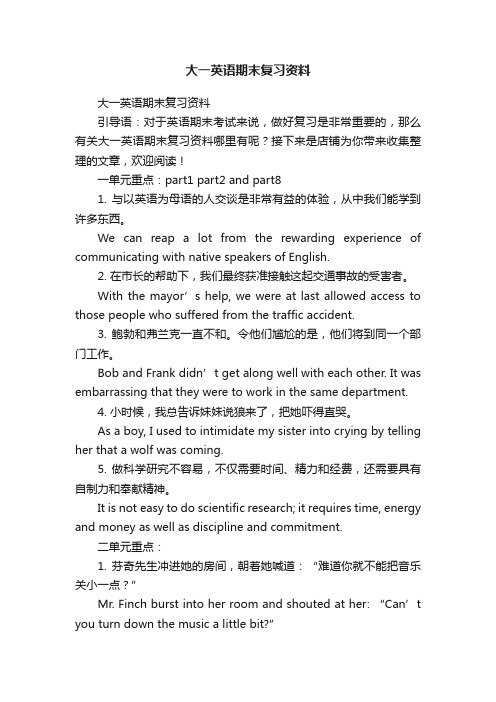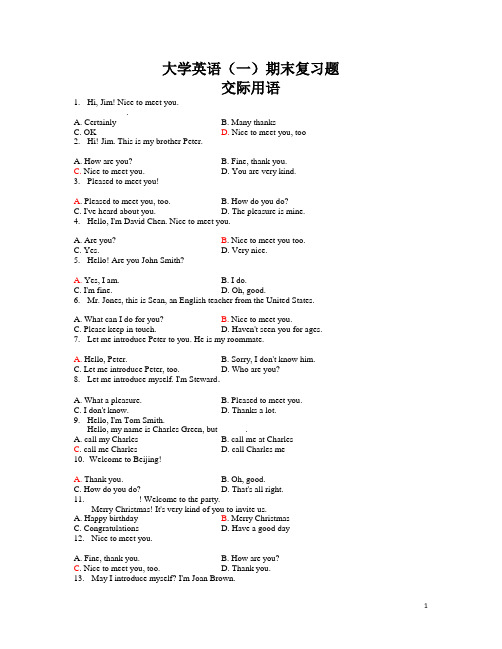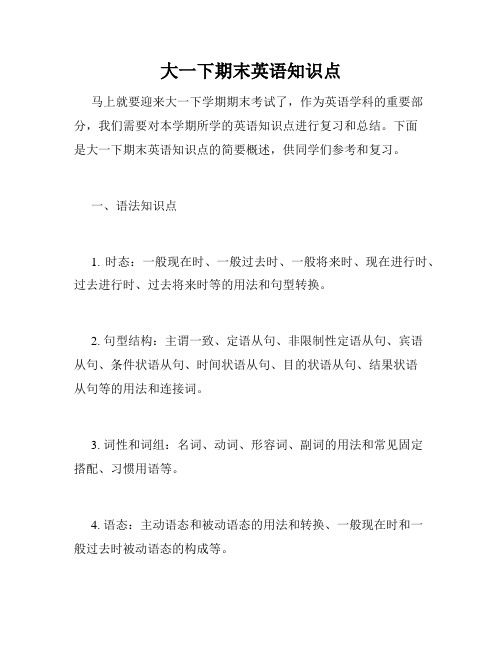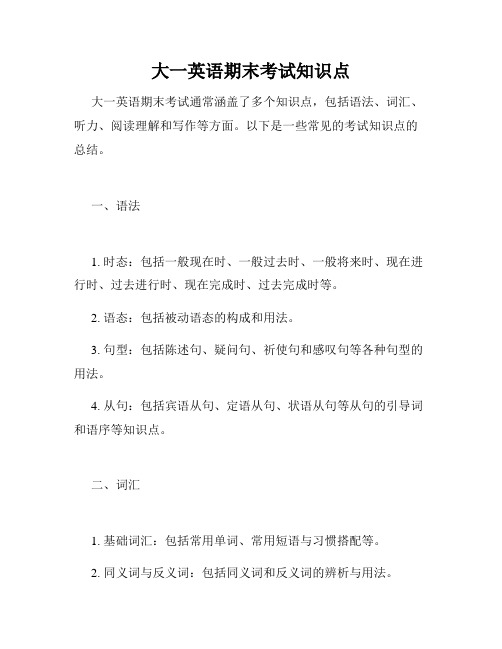大学英语大一期末复习1.2
大一英语期末复习资料

大一英语期末复习资料大一英语期末复习资料引导语:对于英语期末考试来说,做好复习是非常重要的,那么有关大一英语期末复习资料哪里有呢?接下来是店铺为你带来收集整理的文章,欢迎阅读!一单元重点:part1 part2 and part81. 与以英语为母语的人交谈是非常有益的体验,从中我们能学到许多东西。
We can reap a lot from the rewarding experience of communicating with native speakers of English.2. 在市长的帮助下,我们最终获准接触这起交通事故的受害者。
With the mayor’s help, we were at last allowed access to those people who suffered from the traffic accident.3. 鲍勃和弗兰克一直不和。
令他们尴尬的是,他们将到同一个部门工作。
Bob and F rank didn’t get along well with each other. It was embarrassing that they were to work in the same department.4. 小时候,我总告诉妹妹说狼来了,把她吓得直哭。
As a boy, I used to intimidate my sister into crying by telling her that a wolf was coming.5. 做科学研究不容易,不仅需要时间、精力和经费,还需要具有自制力和奉献精神。
It is not easy to do scientific research; it requires time, energy and money as well as discipline and commitment.二单元重点:1. 芬奇先生冲进她的房间,朝着她喊道:“难道你就不能把音乐关小一点?”Mr. Finch burst into her room and shouted at her: “Can’t you turn down the music a l ittle bit?”2. 我喜欢摇滚音乐,因为它通常节奏强,寓意深。
大学英语期末知识点大一

大学英语期末知识点大一大学英语是大一学生必修的一门课程,它的内容丰富多样,包括英语单词、语法、阅读理解、听力和口语等方面的知识。
下面将针对大学英语期末考试的几个重要知识点进行详细介绍。
一、英语单词掌握一定量的英语词汇是理解和应用英语语言的基础。
在期末考试中,通常会涉及词汇选择、词义辨析以及填空等题型。
为了提高词汇量,我们可以通过背单词卡片、词汇书以及在线词汇学习工具来进行学习。
此外,利用单词在句子中的实际运用场景,可以加深对单词的记忆。
二、语法知识掌握英语语法是理解和构建正确句子的基础。
在期末考试中,语法知识主要体现在填空、改错和翻译等题型中。
常见的语法知识点包括时态、语态、虚拟语气、从句和介词等。
我们可以通过阅读语法书籍、练习语法题以及做语法习题来加强对语法知识的掌握。
三、阅读理解阅读理解是大学英语考试的重要组成部分。
在期末考试中,通常会涉及短文的理解、主旨概括、细节把握以及文章写作意图等方面的题目。
为了提高阅读理解能力,我们可以多读英语文章,培养阅读习惯和速度,并学会使用扫读和略读等阅读技巧。
四、听力听力是大学英语考试的另一个重要部分。
期末考试中,听力部分通常包括听对话、听短文和听长对话等。
要提高听力能力,我们可以多听英语材料,如英语歌曲、电影、英语广播等,锻炼自己的听力理解能力。
同时,可以通过做听力练习题和模拟考试,提高对于听力材料的理解和把握。
五、口语口语是英语学习的重要环节之一。
在期末考试中,通常会有口语考试的部分。
为了提高口语表达能力,我们可以多与他人进行英语对话,加入英语角或者组织口语交流活动。
此外,可以模仿英语原声录音或者参加英语口语培训班,提高自己的发音和口语表达能力。
总结起来,大学英语期末考试的知识点主要包括英语单词、语法、阅读理解、听力和口语。
要想在考试中取得好成绩,我们需要通过积极学习相关知识,掌握相关技巧,并进行充分的练习和训练。
只有融会贯通,才能在大学英语的学习中取得好成绩。
大英知识点大一

大英知识点大一Janet stared at her textbook, overwhelmed by the numerous knowledge points she had to grasp for her first-year English class. As she flipped through the pages, she realized that she needed a clear and concise guide to help her navigate through the vast sea of English knowledge. In this article, we will explore some of the key knowledge points that every first-year English student should be familiar with.1. Grammar:Understanding the basic rules of English grammar is essential for effective communication. Here are some key grammar concepts to remember:1.1 Verb Tenses: English has 12 verb tenses, including simple present, present continuous, present perfect, simple past, past continuous, etc. Each tense serves a specific purpose and indicates different time frames.1.2 Parts of Speech: English words are categorized into different parts of speech, such as nouns, verbs, adjectives, adverbs, pronouns,prepositions, conjunctions, and interjections. Knowing the function of each type of word is crucial for constructing proper sentences.1.3 Sentence Structure: English sentences follow a subject-verb-object (SVO) structure. Understanding how to arrange words in a sentence will help you convey your thoughts clearly.2. Vocabulary:Expanding your vocabulary is key to improving your English skills. Here are some ways to enhance your word knowledge:2.1 Word Formation: English words can be formed through various processes, including affixation (adding prefixes or suffixes), compounding (combining two or more words), and conversion (changing the word's part of speech).2.2 Synonyms and Antonyms: Learning synonyms (words with similar meanings) and antonyms (words with opposite meanings) will help you express yourself more precisely.2.3 Collocations: Collocations are word combinations that commonly occur together. Knowing which words typically go together will make your English sound more natural and fluent.3. Reading Strategies:Reading is a crucial skill for academic success. Here are some strategies to improve your reading comprehension:3.1 Skimming and Scanning: Skimming allows you to quickly get a general idea of a text, while scanning helps you locate specific information within a text.3.2 Context Clues: Pay attention to the surrounding words or sentences to deduce the meaning of unfamiliar words.3.3 Annotating: Annotations, such as underlining important points or writing down questions, will help you engage with the text and remember key information.4. Writing Skills:Developing strong writing skills is vital for expressing your ideas effectively. Here are some writing techniques to keep in mind:4.1 Essay Structure: An essay typically consists of an introduction, body paragraphs, and a conclusion. Each paragraph should focus on a specific idea and support it with evidence.4.2 Coherence and Cohesion: Ensure that your ideas flow logically and smoothly throughout your writing. Use transitional words and phrases to connect different parts of your essay.4.3 Proofreading and Editing: Take time to check for grammar and spelling errors, as well as clarity and coherence. A well-edited piece of writing demonstrates your attention to detail and professionalism.In conclusion, mastering the key knowledge points in English grammar, vocabulary, reading strategies, and writing skills is fundamental for all first-year English students. By understanding and applying these principles, Janet and others alike can optimize their learning experience and excel in their studies. Keep practicing and exploring the world of English, and soon you will find yourself navigating its vast ocean with ease.。
大学英语一期末复习题

大学英语(一)期末复习题交际用语1. - Hi, Jim! Nice to meet you.- _________.A. CertainlyB. Many thanksC. OKD. Nice to meet you, too2. - Hi! Jim. This is my brother Peter.- _________A. How are you?B. Fine, thank you.C. Nice to meet you.D. You are very kind.3. - Pleased to meet you!- ________________A. Pleased to meet you, too.B. How do you do?C. I've heard about you.D. The pleasure is mine.4. - Hello, I'm David Chen. Nice to meet you.- _______A. Are you?B. Nice to meet you too.C. Yes.D. Very nice.5. - Hello! Are you John Smith?-_______________A. Yes, I am.B. I do.C. I'm fine.D. Oh, good.6. - Mr. Jones, this is Sean, an English teacher from the United States.- ______________A. What can I do for you?B. Nice to meet you.C. Please keep in touch.D. Haven't seen you for ages.7. - Let me introduce Peter to you. He is my roommate.- _________A. Hello, Peter.B. Sorry, I don't know him.C. Let me introduce Peter, too.D. Who are you?8. - Let me introduce myself. I'm Steward.- _________A. What a pleasure.B. Pleased to meet you.C. I don't know.D. Thanks a lot.9. - Hello, I'm Tom Smith.- Hello, my name is Charles Green, but ______.A. call my CharlesB. call me at CharlesC. call me CharlesD. call Charles me10. -Welcome to Beijing!-_____________A. Thank you.B. Oh, good.C. How do you do?D. That's all right.11. - ___________! Welcome to the party.- Merry Christmas! It's very kind of you to invite us.A. Happy birthdayB. Merry ChristmasC. CongratulationsD. Have a good day12. - Nice to meet you.- _______________A. Fine, thank you.B. How are you?C. Nice to meet you, too.D. Thank you.13. - May I introduce myself? I'm Joan Brown.- _________A. I'm Tod Smith. It's nice to meet you.B. I'm Tod Smith. How old are you?C. Thank you.D. Oh, here is my card. You can have a look.14. - Nice to see you again, Mr. Smith. How are you?- _________A. I miss you.B. Fine. Thank you. And you?C. Are you OK?D. This way, please.15. - How's your family?- _________A. Thanks all the same.B. Thanks for calling.C. Not too bad.D. Don't mention it.16. - Hey, Tom, what's up?- __________A. Yes, definitely!B. Oh, not much.C. What is happening in your life?D. You are lucky.17. - Hi, Tom, how's everything with you?- ___________, and how are you?A. Don't mention itB. Hm, not too badC. ThanksD. Pretty fast18. - Hello, how are you?- _________A. Hello, how are you?B. How do you do?C. Fine, thank you.D. That's OK.19. - How are you getting on today?- _________A. Very well.B. How do you do?C. I'm a doctor.D. Nice to have known you.20. - How are you, Bob?- ________A. How are you?B. I'm fine. Thank you.C. How do you do?D. Nice to meet you.21. - How's your mother doing?- _________A. She is very kind.B. She is very well.C. She is not very old.D. She is doing shopping now.22. - Good morning, John. How are you doing?- _________A. I'm pleased.B. Good night.C. Not so bad. And you?D. How do you do?23. - Hi, haven't seen you for ages! You look fine.- _______. You look well, too.A. GreatB. ThanksC. Oh, noD. Not at all24. - This is John.- ___________A. Oh, I have never seen you.B. Yes, I am glad.C. Hello, John. Nice to meet you.D. How are you?25. - Bye for now.- _________A. The same to you.B. That's OK.C. See you.D. Long time no see.26. - Good night and thanks again.- _______A. You can't say that.B. No, no. It's what I can do.C. How can you say that.D. Good night.27. - I must be going now.- _________A. So soon! I hope you've enjoyed it.B. Have a cup of tea.C. How about a coffee.D. Not at all.28. - It's nearly ten o'clock. It's time for you to go to bed, Kate!- OK. _________, Dad.A. See you laterB. Good-byeC. Good eveningD. Good night29. - We really enjoy ourselves at the party. Thanks again, Mrs. and Mr. Brown.-_______. Just drop in whenever you feel like it.A. Our great honorB. Nice having you hereC. Nice you are hereD. With pleasure30. - I'm glad you like the show.- _________A. Thank you so much for inviting me.B. Yes, I don't like it.C. No, I don't know.D. I'll never go to it again.31. - Shall I drive you to the railway station?- Oh, don't bother about it. I'll take a taxi.- Well, __________!- Thank you and good-bye!A. come onB. helpC. have it checked upD. have a nice trip32. - Sorry to have kept you waiting for so long.- ______________.A. Not at allB. Don 't say soC.I don't think soD. It doesn't matter33. - Sorry I'm late.- _________A. You are welcome.B. It's a pleasure.C. Take care.D. Don't worry.34. - Sorry to trouble you.- _________A. It's a pleasure.B. I don't think so.C. I don't care.D. Excuse me.35. - Oh, sorry to bother you.- _____A. That's Okay.B. No, you can't.C. That's good.D. Oh, I don't know.36. - I'm sorry I'm calling you so late.- __________Okay.A. This isB. You'reC. That'sD. I'm37. - _________to have kept you waiting so long.- Oh, never mind. After all, you are here.A. I am happyB. It's a pleasureC. I am sorryD. I am welcome38. - I must apologize to you for the delay.- _________A. That's all right.B. It's a pleasure.C. All the best.D. You are welcome.39. - I'm awfully sorry.- _________A. I'm sorry, too.B. That's right.C. All right.D. That's all right.40. - I'm sorry to have kept you waiting.- _____________________A. It doesn't matter.B. Forget it.C. My pleasure.D. It's nice of you.41. - I am terribly sorry! I broke the vase.- _________A. I don't want it.B. Don't worry.C. You meant to do it.D. You buy one for me.42. - I'm sorry I'm late.- _________ Come earlier next time.A. Sure.B. You are welcome.C. It doesn't matter.D. I don't know.43. - I didn't mean to do that. Please forgive me.- _________A. Not too bad.B. That's all right.C. It's a pleasure.D. Thank you.44. - I'm sorry I broke your mirror.- Oh, really? _______.A. It doesn't matterB. Don't be sorryC. Not at allD. It's OK with me45. - I'm sorry. I am late due to the heavy traffic.- ________A. Well, it's OK.B. No, it's all right.C. You are welcome.D. You are wrong.46. - I am so sorry to interrupt you again.- _________A. That's good.B. It's all right.C. I don't think so.D. No way!47. - Let me help you carry the suitcase.- _________A. It's OK. I can manage.B. It's not very light.C. I can help you with it.D. Put it down on the ground.48. - Shall I get some chalk for you?- _____________.A. That's rightB. No, thanks, let Tom do itC. I can do it without youD. Not at all49. - Don't worry. I'll leave the message on his desk.- _____________.A. It doesn't matterB. That's all rightC. Thank goodnessD. It's kind of you50. - This box is too heavy for me to carry it upstairs.- _______A. You may ask for help.B. I'll give you a hand.C. Please do me a favor.D. I'd come to help.51. - Oh, the box is too heavy. ______?- No, thanks. I can manage myself.A. What's in itB. Can I help youC. Whose is itD. May I52. - Let me give you a lift.- _________ I prefer to walk on such a lovely day.A. Thank you.B. No, thanks.C. You are welcome.D. No, you can't.53. - Can I help you with the baggage?- _______A. No, no. I can help it myself.B. Thank you.C. Sorry, you can't.D. No, I don't need you.54. - Thank you for your invitation.- _________A. It doesn't matter.B. It's a pleasure.C. It's a small thing.D. I'll appreciate it.55. - Thank you very much.- _________A. It doesn't matter.B. Yes, please.C. You are welcome.D. Forget it.56. -Thank you for your help.- _________.A. It doesn't matterB. You're welcomeC. You're kindD. I don't think so57. - Thank you ever so much for your lovely gift.- _________A. Never mindB. I'm glad you like it.C. Please don't say so.D. No, It's not so good.58. - Good evening, Professor Hardy.- Good evening, John. Come in, please.- Thank you, I hope I am not interrupting you.- No, ____________.A. thank youB. not at allC. thanksD. let it alone59. - This is a birthday present for you.- _________A. What's the problem?B. Oh, what a surprise!C. I can't help it!D. It's a pleasure.60. - I bought this painting in my country. I hope you like it.- _________A. It's a pity.B. You are welcome.C. That's just what I want!D. Is it expensive?61. - Thank you for your great dinner. I really enjoyed it.- __________you enjoyed it.A. I'm so gladB. I'm sorryC. What a pityD. Surprisingly62. - Thank you very much for the dictionary you sent me.- _________A. No thanks.B. I'm glad you like it.C. Please don't say so.D. No, it's not so good.63. - Thank you for the delicious food.- ______________.A. I am glad you enjoyed itB. It doesn't matterC. I don't think it is goodD. Don't say so64. - Thank you for carrying the box for me.- __________.A. Don't say soB. That's my pleasureC. You are kind to say soD. That's all right65. - Thanks a lot. You've gone through so much trouble.- _________A. It's no trouble at all.B. That's good.C. I don't think so.D. That's very kind of you.66. - You seem to be lost. Need help?- _________A. Yes, would you please help me with the bag?B. Help me find my key, please.C. Yes, with pleasure.D. I'm looking for Zhong shan Road.67. - Many thanks.- _________A. It doesn't matter.B. I like it.C. It's my pleasure.D. The same to you.68. - Thanks for inviting me, John, but I've already made other plans.- _________. Maybe another time.A. I hope you enjoy itB. That's goodC. Oh! I'm sorry to hear thatD. Great! I really had a good time69. - Thanks for the lovely party and the delicious food.- _________A. No, thanks.B. Never mind.C. Thank you for coming.D. That's all right.70. - Thank you so much for the book you sent me.- _________A. No, thank you.B. I'm glad you like it.C. Please, don't say so.D. No, it's not so good.71. - I don't know how to thank you enough.-_________.A. No thanksB. Thank you, tooC. Never mindD. It's nothing72. - Thanks for your help.- __________A. My pleasure.B. Never mind.C. Quite right.D. Don't thank me.73. - Thanks for the lovely and delicious food.- ___________.A. No thanksB. Never mindC. All rightD. My pleasure74. - Thank you very much for giving me so much help.- _____________________.A. No thank youB. You're welcomeC. OKD. Thanks75. - Thank you for your nice gifts.- _____________________A. I'm glad you like it.B. No thanks.C. It's very kind of you.D. I'm sorry to hear that.76. - Thank you ever so much for the book you gave me.- _____________________.A. No thanksB. I'm glad you like itC. Yes, it is goodD. No, it's not so good77. - Thank you for inviting me.- _______A. I really had a happy time.B. Oh, it's too late.C. Thank you for coming.D. Oh, so slowly?78. - Thank you for the wonderful meal, Mrs. Hanson.- _________A. Oh, I don't think you ate well.B. I'm not a good cook in fact.C. Be careful next time.D. I'm glad you enjoyed it.79. - Thank you for giving me so much help.- _________A. My pleasure.B. Never mind.C. Yes, thank you.D. It doesn't matter.80. - I'm really grateful to you.- ______A. My pleasure.B. It doesn't matter.C. Don't worry about it.D. That's OK.81. - Hello. May I speak to Peter?- _______A. Sorry, the number is free.B. Yes, speaking.C. Hello. Who're you, please?D. Hello. Thank you for calling.82. - Hello, I'd like to speak to Mark, please.- __________A. Yes, I'm Mark.B. This is Mark speaking.C. It's me here.D. This is me.83. - Hello, I'd like to speak to Jack, please.- _______A. Yes, I'm Jack.B. This is Jack speaking.C. It's me here.D. This is me.84. - Hello, I'd like to speak to John, please.- _____A. No, I'm Mary.B. This is Mary speaking.C. It's him here.D. This is him.85. - Can I speak to Mr. Brown, please?- Yes, _________A. this is me.B. I am Mr. Brown.C. Brown is speaking.D. please speak.86. - Could I speak to Don Watkins, please?- ________A. Speaking, please.B. Oh, how are you?C. I'm listening.D. I'm Don.87. - Hello, who is calling?- _________A. Mary is out.B. Hello, this is William from GM.C. He's in the office.D. Can you hold the line?88. - Hello. Is Jim there?- _________A. This is Jim. Who's speaking, please?B. I'm afraid I won't be free.C. This is the right number.D. There's no hurry.89. - This is Bill speaking. May I speak to Mr. Smith?- _________ Here he comes.A. No, speaking.B. Don't go away.C. Who are you?D. Hold on.90. - AC Company, may I help you?- _________A. I am Jack. May I speak to Miss Jenny?B. This is Jack speaking. May I speak to Miss Jenny?C. This is Jack speaking. Can I find Miss Jenny?D. I am Jack. Can I find Miss Jenny?91. - Is Kate in, please? I want to _______ her.- Sorry, she is out. You'd better call her later.A. troubleB. speak toC. visitD. talk92. - Hello. Is that Mr. White or Mr. Smith speaking?- Sorry, ________________A. who are you?B. don't ask me.C. I don't know.D. would you please ring them up this afternoon?93. - Thank you for calling.- _________A. Don't mention it.B. That's fine.C. Nice talking to you.D. Call back again.94. - Who's speaking?- This is Tom ________.A. speaksB. spokenC. speakingD. saying95. - Hello, could I speak to Miss Fang, please?- ______I'll get her for you.A. Hold on, please.B. I'm Miss Fang.C. Who are you?D. She is at work.96. - Hello. May 1 speak to Jim, please?- _________.A. Who are youB. Who is heC. Who's thatD. Who is it97. - Hello! Is that Mr. Wang speaking?- ________A. Yes. This is Mr. Wang speaking.B. Yes. Can I speak to Mr. Wang?C. Sorry, you'd better ask Mr. Wang.D. No, I can't speak.98. - Can I speak to Mr. Rose?- _________ Can I take a message for him?A. This is he.B. I am afraid he is not in.C. Who are you?D. Sorry. Do you know him?99. - Good morning, may I speak to Mark, please?- _________A. Who's there?B. Who's that speaking?C. Who are you?D. Who wants to speak to Mark?100. - May I speak to Dr. Brown?- _________A. Yes, he is not in at the moment.B. No, you can't.C. Yes, this is Brown speaking.D. Sorry, speaking.写作1. The Book I Like Best你最喜欢哪本书;喜欢的理由。
大一下期末英语知识点

大一下期末英语知识点马上就要迎来大一下学期期末考试了,作为英语学科的重要部分,我们需要对本学期所学的英语知识点进行复习和总结。
下面是大一下期末英语知识点的简要概述,供同学们参考和复习。
一、语法知识点1. 时态:一般现在时、一般过去时、一般将来时、现在进行时、过去进行时、过去将来时等的用法和句型转换。
2. 句型结构:主谓一致、定语从句、非限制性定语从句、宾语从句、条件状语从句、时间状语从句、目的状语从句、结果状语从句等的用法和连接词。
3. 词性和词组:名词、动词、形容词、副词的用法和常见固定搭配、习惯用语等。
4. 语态:主动语态和被动语态的用法和转换、一般现在时和一般过去时被动语态的构成等。
二、阅读技巧和题型1. 题干分析:通过理解题干中的关键词和句子结构,进行选项筛选和解题。
2. 推断信息:通过理解文章的上下文,进行信息的推断和判断。
3. 短文填空:根据文章内容和上下文,选择合适的单词或短语填入空格,使文章通顺完整。
4. 阅读理解:理解文章的大意和细节,回答问题、判断正误或完成句子等。
5. 完型填空:根据短文的上下文语境,选择合适的单词或短语填入空格,使短文通顺完整。
三、写作技巧和题型1. 书面表达:写作时要注意语法结构、语言表达、逻辑关系和篇章结构的合理运用。
2. 话题作文:根据给定的话题,进行观点陈述、论述优劣、对比分析、解决问题或给出建议等。
3. 图表作文:根据图表提供的信息,描写趋势、分析原因、解释结果或做比较等。
4. 说明文写作:根据给定的说明,进行事件的描述、规则的介绍、操作的步骤或原理的解释等。
四、听力技巧和题型1. 主旨理解:通过听取主要信息,理解对话或短文的主旨和目的。
2. 细节理解:通过听取细节信息,获取对话或短文中的具体信息和细节。
3. 对话回答问题:根据对话的内容进行问题的回答,关注信息的对比和选择。
4. 短文回答问题:根据短文的内容进行问题的回答,注意理解短文的主题和结构。
《大学英语一》期末复习指导

《大学英语一》期末复习指导《大学英语一》复习指导一、单选题知识点期末考试中单选题会有15小题,每题2分,共计30分。
知识点1:冠词用法定冠词和不定冠词的区别是每年必考的知识点,甚至一年会考两道题,大家一定要掌握!先给大家介绍a, an, the三者的区别吧:不定冠词a/an与可数名词的单数搭配,相当于汉语中的“一”,指某一类人或事物中的非特指的“任何一个”。
a和an的区别如下表:定冠词the表示某个或某些特定的人或事物,与可数名词的单数、可数名词的复数和不可数名词搭配,相当于汉语中的“这个、那个、这些、那些”,有一些固定的用法:知识点2:代词的用法考试中常考的代词有两类:人称代词和物主代词。
我们先来概览人称代词和物主代词:人称代词用于代替人或物。
物主代词表示所有关系的代词,分为形容词性物主代词和名词性物主代词两种。
我们要知道二者的区别:知识点3:there be句型这个语法点相对较简单。
表示“在某处有/存在……”可以用there is/there are...结构。
如果名词为复数,动词用are,名词为单数,动词用is,例如:There is a man in the office. 办公室里有一个男人。
There are two plants in the house. 房间里有两盆植物。
疑问句形式要将is/are置于句首(Is there...?/Are there...?),例如:Is there a fax in the office? 办公室里有传真机吗?Are there any plants in the house? 房间里有植物吗?常考知识点4:some和any,how many和how much的区别这两组词的区别很简单,我们只要记住以下用法就可以。
先来看some和any的用法:some和any 既可以修饰可数名词又可以修饰不可数名词,some 常用在肯定句中,而any则常用在否定和疑问句中。
大一期末考英语复习整理

大一期末考英语复习整理Unit 1Para.1The idea of becoming a writer had come to me off and on since my childhood in Belleville ,but it wasn,t until my third year in high school that the possibility took hold.Until then I'd been bored by everything associated with English courses.I found English grammar dull and difficult.I hated the assignments to turn out long,lifeless paragraphs that were agony for teachers to read and for me to write.从孩提时代,我还住在贝尔维尔时,我的脑子里就断断续续地转着当作家的念头,但直等到我高中三年级,这一想法才有了实现的可能。
在这之前,我对所有跟英文课沾边的事都感到腻味。
我觉得英文语法枯燥难懂。
我痛恨那些冗长而乏味的段落写作,老师读着受累,我写着痛苦。
Para. 5Studenly I wanted to write about that,about the warmth and good feeling of it,but I wanted to put it down simply for my own joy.not for Mr.Fleagle.It was a moment I wanted to recapture and hold for myself.I wantedto relive the pleasure of that evening.To write it as I wanted,however,would violate all the rules of formal composition I'd learned in school,and Mr.Fleagle would surely give it a failing grade.Never mind.I would write something else for Mr.Fleagle afrer I had written this thing for myself. 突然我就想描述那一切,描述当时那种温馨美好的气氛,但我把它写下来仅仅是想自得其乐,而不是为弗利格尔先生而写。
大一英语期末考试知识点

大一英语期末考试知识点大一英语期末考试通常涵盖了多个知识点,包括语法、词汇、听力、阅读理解和写作等方面。
以下是一些常见的考试知识点的总结。
一、语法1. 时态:包括一般现在时、一般过去时、一般将来时、现在进行时、过去进行时、现在完成时、过去完成时等。
2. 语态:包括被动语态的构成和用法。
3. 句型:包括陈述句、疑问句、祈使句和感叹句等各种句型的用法。
4. 从句:包括宾语从句、定语从句、状语从句等从句的引导词和语序等知识点。
二、词汇1. 基础词汇:包括常用单词、常用短语与习惯搭配等。
2. 同义词与反义词:包括同义词和反义词的辨析与用法。
3. 词性与词汇搭配:包括名词、动词、形容词和副词等词性的用法以及常见的词汇搭配。
三、听力1. 听力材料:包括对话、独白、新闻报道等各种听力材料。
2. 听力题型:包括听力选择题、填空题、判断题等各种题型。
3. 听力技巧:包括抓关键词、预测内容、注意时间等听力技巧。
四、阅读理解1. 阅读材料:包括短文、图表、广告等各种阅读材料。
2. 阅读题型:包括选择题、填空题、判断题和匹配题等各种题型。
3. 阅读技巧:包括略读、精读、提前预测、寻找关键词等阅读技巧。
五、写作1. 作文题目:根据具体考试要求写作不同主题的作文,可能涉及到描述、议论、说明和应用文等不同的文体。
2. 写作结构:包括引子、主体、结尾等作文的基本结构。
3. 写作技巧:包括使用丰富的词汇、合适的句式、清晰的逻辑和恰当的语法等写作技巧。
以上是大一英语期末考试常见的知识点总结。
希望通过对这些知识点的复习和准备,能够在考试中取得好成绩。
祝你成功!。
- 1、下载文档前请自行甄别文档内容的完整性,平台不提供额外的编辑、内容补充、找答案等附加服务。
- 2、"仅部分预览"的文档,不可在线预览部分如存在完整性等问题,可反馈申请退款(可完整预览的文档不适用该条件!)。
- 3、如文档侵犯您的权益,请联系客服反馈,我们会尽快为您处理(人工客服工作时间:9:00-18:30)。
1.Having a 24/7 lifestyle can also interrupt regular sleep patterns.拥有24/7的生活方式也可以打断正常的睡眠模式。
2. This morning Microsoft CEO Satya Nadella published a report on his vision for the company’s future.今天早上,微软CEO萨提亚·纳德拉公布了公司未来在他的视觉报告。
Henry has many friends working in the government. His sources of information are usually reliable.亨利有许多朋友在政府工作。
他的情报来源通常是可靠的。
4. We believe that building a powerful navy is in the interest of our national defense.我们相信建设一支强大的海军符合我们国防的利益。
5. One of the first flight training lessons taught to student pilots is how to perform a(n) emergency landing in a small airplane.第一个飞行训练课程教给学生飞行员是如何执行(N)紧急降落在一架小型飞机上。
6. Tom was on the point of leaving the garden when he heard someone cry: “Isn’t it Tom? I can hardly believe my eyes.”汤姆刚要离开花园,突然听到有人喊:“不是汤姆吗?”我简直不敢相信自己的眼睛。
”7. When you read the newspaper, you’re probably not reading it word-by-word, instead you’re scanning the text.当你读报纸的时候,你可能不是逐字读的,而是在浏览文本。
8. The use of animals not only allowed heavier loads to be hauled by them, but also enabled humans to ride the animal so they could travel longer distances in a shorter amount of time.动物的使用不仅使它们能承受更重的负荷,而且使人类能够骑着动物,以便在更短的时间内能走更远的距离。
9. No matter how busy you are, you should remember to stay in touch with people you love and care about.不管你有多忙,你应该记住和你爱的人保持联系。
10. Is it worth the time and money to fix up an old car? It’s a question for a lot of old car owners these days.修理一辆旧汽车值得花时间和金钱吗?这是很多老车主最近的问题。
11.Human’s first means of transportation was walking and swimming.人类的第一种交通工具是散步和游泳。
12. With water demand growing, the conflict between the two neighboring villages over water has intensified over the years.随着水资源需求的增长,两个相邻村庄在水上的冲突多年来愈演愈烈。
13. Make sure you don’t fall into the habit of eating unhealthy foods for breakfast; instead, start your day with a simple, balanced meal.确保你不会养成吃不健康食物的习惯,而是开始一天简单而均衡的饮食。
14. These figures show that the death rate of road accidents gets higher as the speed of the car increases.这些数字表明,随着汽车速度的提高,道路交通事故的死亡率也越来越高。
15. You see the lights in the students’ reading room? They never go out at night these days because the final exams are around the corner.你看到学生阅览室里的灯了吗?他们这些天晚上从不出去,因为期末考试就要到了。
16. Hot money flows around the world looking for investments that will yield high returns.热钱流向世界各地寻找能带来高回报的投资。
17. Have you contacted the previous owner of this house? Did he sell it directly to you?你联系过这个房子的前任主人吗?他直接卖给你了吗?18. Starting from Thanksgiving, many of us are already anticipating gaining some weight because it’s hard to stick to healthy eating habits during holidays.从感恩节开始,我们中的许多人已经预料到体重会增加,因为在假期里很难坚持健康的饮食习惯。
19. If you are afraid that you will fail to make friends, you are probably going to have a very hard time interacting with others.如果你担心你交不到朋友,你可能很难与他人交往。
20. For a while, that story book was indeed very popular, but it was not long before the demand declined.这本故事书确实很受欢迎,但不久之后需求就下降了。
21. The new system is said to enable use much less oil than before, in other words, to increase energy efficiency considerably.据说这种新系统可以比以前使用更少的石油,换句话说,可以大大提高能源效率。
22. If short-term sleeping problems are not managed properly from the beginning, they can last long and thus compromise good health.如果短期睡眠问题从一开始就没有得到妥善的管理,那么它们会持续很长时间,从而危及健康。
23. A big proportion of tigers die of human demand for their bones.很大一部分老虎死于人类对骨骼的需求。
24. Much to my annoyance, whenever I criticize her, she always comes up with an excuse.令我非常烦恼的是,每当我批评她时,她总是找借口。
25. This shelf holds 80 pairs of shoes with prices ranging from $120 to $150.这个架子上有80双鞋,价格从120美元到150美元不等。
26. I caught the flight thanks to the ride you gave me.多亏你给我的那次旅行,我才赶上了飞机。
27. A study has found that the vast majority of college graduates work in jobs that aren’t strictly related to their majors.一项研究发现绝大多数大学毕业生的工作与他们的专业没有严格的关系。
28. Different from her father, who is a remarkable writer, Ella doesn’t seem to have any interest in reading and writing.与她父亲是一位杰出的作家不同,埃拉似乎对阅读和写作不感兴趣。
29. In the 19th century, the invention of the steam engine made land transportation independent of human or animal power.十九世纪,蒸汽机的发明使陆地运输不再依赖人或动物的力量。
30. In the absence of anyone to spend New Year’s Eve with, I went to watch a show alone and I truly enjoyed it.在没有人过除夕的时候,我独自去看了一场演出,我真的很享受。
31. Usually the sleeping problems disappear when the stressful situations pass.通常情况下,当紧张的情况过去时,睡眠问题就会消失。
32. Oil prices in China now follow global trends.在中国现在的石油价格跟随全球趋势。
33. Environmental factors such as a room that’s too hot or cold, too noisy or too bright can be a(n) obstacle to sound sleep.环境因素,如太热或寒冷、太吵或太亮的房间,都可能妨碍健康的睡眠。
